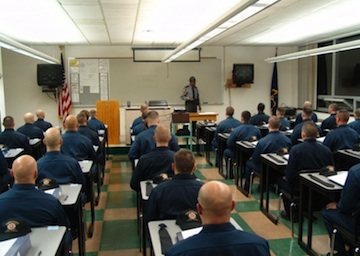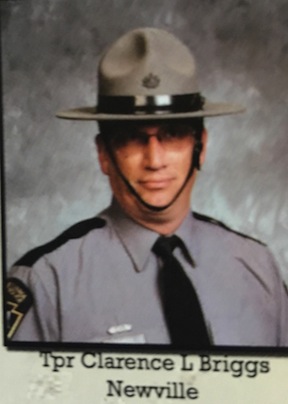We don’t need another incomplete cover-up by the Office of Inspector General of the State Police Academy cheating scandal — we need a real investigation with teeth by the Attorney General’s office
How bad is corruption in Pennsylvania government?
Last week Pennsylvania State Police Commissioner Tyree Blocker sent a powerful message that corruption is so entrenched and out of control in Pennsylvania that even the State Police are powerless to properly investigate it, let alone do anything about it.
As most readers know, the Pennsylvania State Police — one of the oldest and largest law enforcement institutions in the country — has been rocked by a cheating scandal at its cadet academy in Hershey.Out of this year’s graduating class of 116, at least 36 cadets (some say 39) were removed or quit when they were found to have cheated on exams. More than another dozen have been prevented from graduating to the corp while investigations continue.
But that’s only the surface of the problem.
Indications are that for years instructors at the State Police Academy gave away answers, reused old tests, turned a blind eye on dishonesty, and allowed cheating.
So what we have here is a culture of corruption.
At the Pennsylvania State Police Academy, longstanding tolerance of corruption and dishonesty allowed this misbehavior to take root, find protection, and flourish.
Reasonable questions remain: How long has this been going on? Of the 6,000 men and women currently employed as state troopers, how many knew about cheating at the academy in past years? Why did no one report it? How many current state troopers benefited from corruption at the academy, and cheated on tests, and so don’t deserve to be state troopers today?
These are important questions if we are to have confidence in the honesty and integrity of our State Police. Which, after all, we should have.
Unfortunately, this week State Police Commissioner Blocker acknowledged that the problem might be so bad that the State Police and its Internal Affairs Division (IAD) may be unable to properly and reliably investigate itself.
In a news release issued last week, Commissioner Blocker wrote that he was asking the governor’s Office of Inspector General to investigate the academy cheating scandal:
“In December of last year, the Pennsylvania State Police’s Internal Affairs Division initiated an investigation of cheating at our Academy. As a result, a significant number of cadets have either resigned or been dismissed,” Blocker writes.
“
While many important changes are already underway, and although I have tremendous confidence in the ongoing IAD investigation, I believe that given the broad nature of recent allegations reported in the press, an outside investigation is in the best interest of both the State Police and the people of Pennsylvania.
“As a result, I have requested that the Office of Inspector General initiate a comprehensive investigation upon a referral from the State Police. I am requesting OIG to use its experience and resources to look at allegations about the Academy. In addition, I have asked OIG to consider what factors may have contributed to any misconduct and make recommendations.”
As if this isn’t bad enough, here’s the bad news: as long-time hands in Harrisburg know, the governor’s Office of Inspector General is not up to the job of reliably investigating much of anything, or anyone.
The problem, as its own website explains, is that the Office of Inspector General is not a law enforcement agency. It cannot arrest anyone, or even issue subpoenas to force anyone to talk or turn over documents:
“The Office of Inspector General is not a law enforcement organization (for example, we do not have power of arrest),” its website explains. “However, any unlawful or criminal conduct discovered during the course of an investigation will be referred to the appropriate law enforcement entity.”
“Does the Office of Inspector General have subpoena power?” its website rhetorically asks.
“No,” is the simple answer.
The Inspector General’s website then goes on to list entire categories of corruption that they refuse to, well, inspect:
“We are not the appropriate forum for complaints related to city or municipal officials, county officials, federal officials or federal or state judges,” the website explains. “We decline to investigate complaints where an employee is merely dissatisfied with a supervisor or work assignment. We also decline to investigate anything that has been fully adjudicated (administratively or in court) or is pending before an administrative agency or pending in civil or criminal court. Finally, we are not equipped to investigate prisoner complaints that been adjudicated through administrative or criminal review channels.”
Let’s break this down.
“We decline to investigate anything that … is pending before an administrative agency or pending in civil or criminal court.” Sounds like the academy cheating scandal, doesn’t it?
Additionally, corruption in Pennsylvania has become interconnected between state, federal and local agencies.
The state, for example, plays an important role in approving the financial schemes of local municipalities like Harrisburg or Lancaster. But the Inspector General will refuse to investigate these local entities, so it can provide no complete or useful picture of any corruption or malfeasance involving local and state offices in cahoots with each other.
In the state court’s pornographic email scandal, for another example, state officials such as cabinet secretaries are involved — and they’re sending inappropriate emails to state judges and federal employees, such as U.S. court clerks and federal prosecutors.
By its own reckoning, then, the Inspector General cannot properly investigate the porno email scandal.
“We decline to investigate complaints where an employee is merely dissatisfied with a supervisor or work assignment,” the Inspector General’s website tells us.
What if a state trooper was aware of cheating at the academy, but feared retaliation from supervisors if he or she came forward?
Or, more to the point, what if members of the State Police’s own Internal Affairs Division can’t properly investigate the cheating scandal because they fear retaliation from higher-ups in the State Police, as now appears to be the case? The Inspector General by its own admission can’t or won’t investigate that.
So who’s the Wolf Administration trying to kid by calling in the Office of Inspector General?
A few years back, York County Chief Detective Becky Downing alleged deep-rooted corruption in the York County courthouse, and in the DA’s office. GOP state Senator Dan Delp had been caught hiring a prostitute from a political operative with close connections to the DA’s office.
The York County’s Republican district attorney naturally refused to investigate allegations of deep-rooted corruption in his own office, and courthouse. Republican Tom Corbett, then the attorney general with his eye on the governor’s mansion, also declined a formal request from Chief Downing to investigate the Republican county DA — Corbett’s political ally.
So I wrote the state Inspector General, asking him to investigate.
In a letter dated April 28, 2006, C. Jeffrey Goble of Pennsylvania’s Office of Inspector General, wrote back to tell me the “Pennsylvania Office of Inspector General (OIG) … has no jurisdiction over criminal matters. …(T)hose allegations should be reported to local, state, or federal law enforcement agencies.”
From this we see that the Inspector General’s office has long been part of the circular run-around that prevents real investigations of corruption in Pennsylvania.
If the Inspector General’s staff by some luck or pluck happens to find criminal misbehavior at the State Police academy, what will they do?
“Any unlawful or criminal conduct discovered during the course of an investigation will be referred to the appropriate law enforcement entity,” the Inspector General’s website explains.
So they’ll turn the investigation over to — pinch yourself — the State Police, or the attorney general — who should be conducting a real investigation in the first place.
From all this we can surmise that Gov. Tom Wolf (himself from York County) doesn’t want a real, independent investigation of the State Police or its academy. Rather, he wants window dressing.
It’s not about protecting the public, or upholding the law.
It’s about protecting the State Police, and controlling the investigation.
Pennsylvanians don’t need another incomplete cover-up by the Office of Inspector General of the State Police academy cheating scandal.
We need a real investigation with teeth by the Attorney General’s office.
How bad is the problem? Recent events show it’s not merely academic.
This weekend, retired State Police trooper Clarence Briggs, a State Police veteran with 24 years on the force, shot and killed two people while he was attempting to rob a Pennsylvania turnpike tollbooth.In 2014, Briggs had been charged with assaulting his wife. But the charges were dropped.
Briggs’ attorney, Harrisburg lawyer Corky Goldstein, tells me he didn’t suspect that his client, the retired state trooper, could be capable of killing innocent people in cold blood.
“I surely don’t remember there being any issues regarding mental instability,” Goldstein says. “He could have been having problems that I did not see. None of us know in most occasions what is going on in the head of somebody else.”
With a history of violence and financial problems, the State Police probably should have kept tabs on Briggs, and suspected problems.
This Sunday, another State Police trooper, in the line of duty, had to shoot and kill retired State Trooper Briggs to finally stop him.




You have hit many nails smack on their heads Bill. I fear Pennsylvanians just don’t understand what has happened to their once trusted and esteemed institutions. Corruption is so entrenched, so thorough, so common, apparently only a very few have the slightest idea what is going on. We need the FBI to send a massive task-force into our commonwealth and to remain here until every root of conspiratorial corruption has been removed. Organized Crime is us. OC has PA by the balls and they’re not the old-fashioned mobsters of Al Capone era and John Gotti’s.
Our thugs wear black nightgowns, serve in our branches of government, inspect our institutions looking for corruption, and their lawyers who protect the whole bunch.